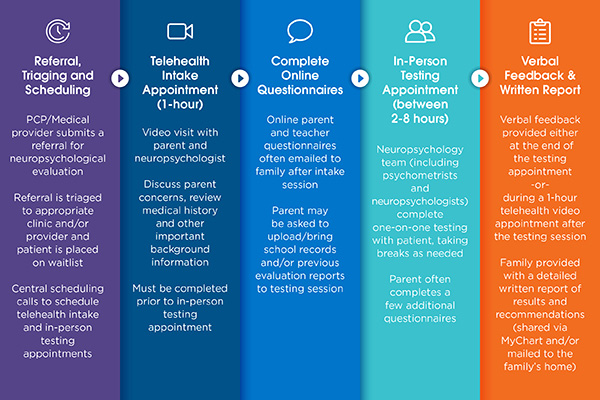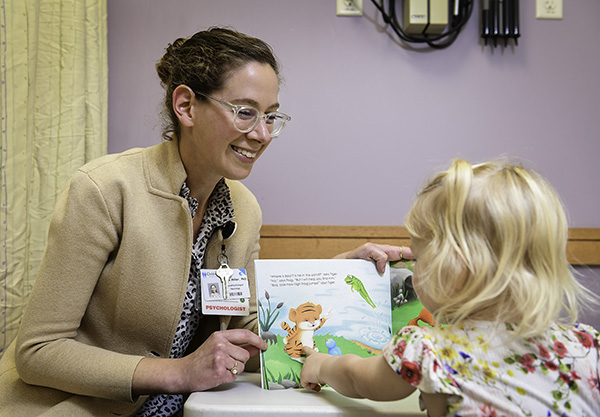
Your pediatric neuropsychological evaluation will be tailored to meet the needs of your child. Depending on the background, the current concerns, and whether they have been evaluated previously, most children’s neuropsychology evaluations take between two to eight hours to complete. Depending on the age and needs of your child, testing may be completed in one day or over the course of several days.
You will be asked to participate in an interview (through video visit) regarding your child's developmental history and to complete several questionnaires about your child's emotional and behavioral functioning.
One to two testing sessions may be scheduled. You will be asked to bring with you any records of previous testing or individualized education plans (IEPs) to the testing appointment. On that day, your child will be asked to complete a variety of paper and pencil, puzzle, and computer tasks similar to things he or she may do at school. For very young children and infants, the test session looks more like playtime using familiar toys. Depending on the goal of testing and the child’s age, the testing will be conducted by highly trained psychometrists who work with your child in an individualized setting. No medical procedures are involved.
Results of testing and recommendations from the evaluation will be shared with you either at the end of the testing day or during a virtual visit scheduled for a separate day.
Neuropsychological Evaluation
Prerequisites for Evaluation
- Patient must have a medical, neurological, and/or genetic disorder impacting brain or central nervous system (rare exceptions)
Presenting Concerns/Diagnoses Served
- Cognitive dysfunction
- Cognitive delays
- Changes in cognition
- Pre/Post neurosurgery
- Impact of medical treatment on cognitive functioning
Evaluation Goals
- Differential diagnosis of neurobehavioral syndrome/cognitive dysfunction
- Identification of cognitive strengths and weaknesses
- Identification of interventions needs
- School recommendations
- Determine neurosurgical and/or treatment risk
Typical Assessment Tools
- IQ/General cognitive functioning
- Attention
- Executive functioning
- Processing speed
- Fine motor dexterity
- Language
- Visual-spatial/nonverbal
- Social/Emotional functioning
Typical Recommendations
- Integration of cognitive profile for medical treatment/surgical planning
- Need for services (e.g., OT, ST, medication, etc.)
- School strategies and programming
- Therapy approaches and referrals
Psychological Evaluation
Prerequisites for Evaluation
- Family expressed concerns to their primary care provider
- Patient engaged in mental behavioral health therapy
Presenting Concerns/Diagnoses Served
- ADHD
- Anxiety disorders
- Mood disorders
- Traumatic stress
- Intellectual disability
- Learning disability
- Behavior concerns
Evaluation Goals
- Differential diagnosis of mental and behavioral disorder
- Identification of cognitive and academic strengths and weaknesses
- Identification of therapy or medication need
- School recommendations
Typical Assessment Tools
- IQ/General cognitive functioning
- Academic Skills
- Social/Emotional functioning
Typical Recommendations
- Need for services (e.g., OT, ST, medication, etc.)
- School strategies and programming
- Therapy approaches and referrals
- Parenting strategies to support social and emotional development
Who Is a Pediatric Neuropsychologist?
A pediatric neuropsychologist is a psychologist that has earned a PhD or PsyD in clinical psychology and has completed specialized training including a post-doctoral fellowship in neuropsychology. A pediatric neuropsychologist specializes in examining how learning and behavior are related to the development of children’s brain structures and systems. A pediatric neuropsychologist specializes in examining how brain injury or disease can impact a child’s brain development and their learning and behavior. A few common techniques used by neuropsychologists in his evaluation include puzzles and both computer- and paper-based tasks. After testing, our neuropsychologists interpret the results and provide research-based recommendations to help the child progress and learn at their fullest potential.
Evaluations vary depending on the age and development of the child and why they were referred for an evaluation. Some reasons for referral include:
- Determine the child's level of cognitive functioning
- Identify changes in brain function as a result of medical/neurological illness or injury
- Assist in school and medical treatment planning
- Determine level of functioning prior to treatment/intervention (baseline testing)
- Determine response to or recovery from treatment/intervention (follow-up testing)
- Monitor brain development and guide treatment decisions
Pediatric neuropsychological evaluations look at various different aspects of brain health and development. Some areas include:
- General intellectual abilities
- Attention capacity
- Executive skills (organization, planning, inhibition or flexibility)
- Learning and memory
- Language skills
- Visual-spatial skills
- Fine motor coordination
- Behavioral and emotional functioning
- Social and academic skills





